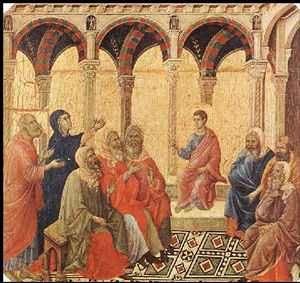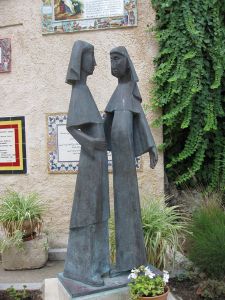1st Sunday of Christmas, year C, 2015 (preached 12/27/15)
first reading: 1 Samuel 2:18-20, 26
Psalm 148
second reading: Colossians 3:12-17
gospel reading: Luke 2:41-52
*On this day I had the honor of being a guest worship leader at a neighboring congregation.
Our gospel reading for today, the story of the child Jesus in the Temple, is the ONLY story in the Bible we have from Jesus’ childhood.
In some ways it is a very unremarkable story. Not that it isn’t terrifying, especially from Mary and Joseph’s point of view – but it’s an event that has happened to many families – a child going lost. And there is no divine intervention to fix it – just desperate parents searching.
When most of us read this story we identify with Mary and Joseph. I certainly do. My family went through it with my then 5 year old autistic daughter. We were on a family vacation at the shore and in a split second she went missing on the beach. She was gone for over an HOUR, while we, the police, life guards and volunteers scoured the beach in search of her.
That hour was one of the most terrifying, horrific and frantic hours of my whole life.
Jesus was missing for FOUR DAYS.
A day’s journey BACK to Jerusalem from the point at which they realized he wasn’t in their group, and then three days searching Jerusalem. I can fully understand Mary’s anger and frustration that I’m sure stemmed from intense fear, and as she stated “great anxiety.”
I can imagine her yelling and squeezing Jesus tight at the same time. For four days her son had been lost. For four days she and Joseph had looked for him with great anxiety. Finally finding him in the Temple, along with the relief and gratitude over what I’m sure were prayers answered, was the typical anger any parent would feel at their older child who didn’t keep up with the group and ended up lost.
But Jesus didn’t respond with gratitude over being found. He doesn’t even seem happy to see them. His response seems to be more annoyance at their seeming ignorance. “Why were you searching for me? Did you not know that I must be in my Father’s house?”
“For crying out loud mom, what have you been doing the past three days, didn’t you know this is where I would be? What were you thinking?” Ungrateful pre-teen.
But Jesus had a point. Where else would they think he’d be?
It’s easy for us to say if WE were searching for Jesus we would look for him in his Father’s house. It seems obvious, but perhaps it’s not.
Where do we look when WE are the ones searching for Jesus?
Where do we look when we seek peace, a sense of wholeness, completeness? Where do we look when we need to find security and love? Where do we look when we need to find our “center” – our “anchor?”
Oftentimes, I’m afraid, we wander around grasping at straws, at anything that will, even temporarily, give us the feeling that we’ve found “it.” And our culture doesn’t help much. In our culture Christmas was over Friday, and the only real reason for Christmas in the first place is the next big sale.
We look in a lot of different places to try to find our Jesus. And we wreak havoc with the first commandment in the process.
We look in the department store for that one thing to buy ourselves that will make us happy. We go to the car dealership to find the make and model that will make us cool. We go to the beauty department and try different kinds of cologne, perfume or make-up that will make us attractive to others. We might even look to the liquor store or drug dealer to help soothe pain in our lives, to make us feel “ok.”
Problem with all those things is that they don’t work. Oh, maybe for a while. The high of a new toy is amazing, but it doesn’t last.
I saw a saying on the internet a few weeks ago that struck right to the heart of the matter. It said: “The ads lie. The anxiety in your soul will not be settled by anything you can buy in a store.”
We search and look and seek and wander and grasp at things that we hope can fill the holes in our souls.
And all the while, Jesus is here.
All the while Jesus is saying, “Why are you searching? Didn’t you know I would be HERE?”
Even those of us already sitting here can forget this sometimes. That’s why we need to constantly bring ourselves back to where we KNOW we will find Jesus.
Where we KNOW we can find peace. Where we KNOW we can bring all our hurts and doubts and fears. Jesus promises to be HERE, where two or three are gathered together; where the sacraments are celebrated and the Word is preached.
It’s too easy for our fragile hearts and minds to forget. It’s too easy to get caught up in looking for happiness, security and love in all the “wrong” places.
Let’s keep finding Jesus here, where we are constantly reminded of a love SO great that it was willing to die for us. Where we are reminded that even when we’ve failed we are STILL loved, always loved, always treasured, always precious no matter what.
Let’s keep finding Jesus here so that we remember there is an anchor who can hold us firm even in the middle of the greatest storms of life – so that we have the strength in our souls to withstand all the “ads that lie.”
Let’s keep finding Jesus here, so that when we leave here we can bring Jesus to those around us who are searching and hurting.
Let’s keep finding Jesus here, so that we learn and re-learn and re-learn again to see Jesus in our neighbor.
Let’s keep finding Jesus here – for when we know and are constantly reminded that we find him here, we can begin to see him everywhere.
AMEN.

